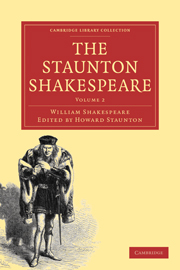Book contents
- Frontmatter
- Contents
- ALL'S WELL THAT ENDS WELL
- KING HENRY THE FIFTH
- AS YOU LIKE IT
- PERICLES, PRINCE OF TYRE
- TWELFTH NIGHT; OR, WHAT YOU WILL
- THE FIRST PART OF KING HENRY THE SIXTH
- THE SECOND PART OF KING HENRY THE SIXTH
- THE THIRD PART OF KING HENRY THE SIXTH
- TIMON OF ATHENS
- KING RICHARD THE THIRD
- MEASURE FOR MEASURE
- KING HENRY THE EIGHTH
- CYMBELINE
AS YOU LIKE IT
Published online by Cambridge University Press: 29 August 2010
- Frontmatter
- Contents
- ALL'S WELL THAT ENDS WELL
- KING HENRY THE FIFTH
- AS YOU LIKE IT
- PERICLES, PRINCE OF TYRE
- TWELFTH NIGHT; OR, WHAT YOU WILL
- THE FIRST PART OF KING HENRY THE SIXTH
- THE SECOND PART OF KING HENRY THE SIXTH
- THE THIRD PART OF KING HENRY THE SIXTH
- TIMON OF ATHENS
- KING RICHARD THE THIRD
- MEASURE FOR MEASURE
- KING HENRY THE EIGHTH
- CYMBELINE
Summary
This charming dramatic pastoral was first printed, it is believed, in the folio, 1623. On the Stationers' Registers, however, is an entry, conjectured, with good reason, to belong to the year 1600, which may induce a different conclusion. It runs thus: —
“4 Augusti.
“As you like yt, a book. Henry the ffift, a book. Every Man in his humor, a book. The Commedie of Much Adoo about Nothinge, a book. To be staied.”
The object of the “stay,” as Mr. Collier supposes, was no doubt to prevent the publication of these plays by any other booksellers than Wise and Apsley; and as the three other “books” were issued by them in a quarto form, probabilities are in favour of the fourth having been so published also. At all events, there are sufficient grounds for hope that a quarto edition may some day come to light. “As You Like It” is founded on Lodge's novel, entitled “Rosalynde, Euphues Golden Legacy,” &c., 1590; which in turn was derived from the “Coke's Tale of Gamelyn,” attributed to Chaucer, and sometimes printed in his works, though now very generally believed to be the work of another and much inferior hand.
The quotation, in Act. III. Sc. 5, from Marlowe's poem of “Hero and Leander,”—
“Who ever lov'd, that lov'd not at first sight?”—
which appeared in 1598; the circumstance of its not being included in the list by Meres; and the memorandum above mentioned in the Stationers' Registers, have led Malone and others, we think rightly, to assign the composition of “As You Like It” to the year 1599.
- Type
- Chapter
- Information
- The Staunton Shakespeare , pp. 123 - 176Publisher: Cambridge University PressPrint publication year: 2009First published in: 1859

